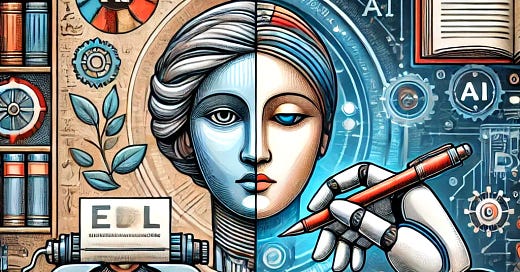Navigating the Threat of AI in Marketing, Journalism, and Creative Works
How innovation and ethics align to protect human creativity in the AI era
Artificial intelligence is transforming marketing, journalism, and creative industries, opening opportunities and raising ethical concerns. Businesses can quickly and affordably create content with AI, but they need to address the new challenges that this efficiency brings responsibly.
From potentially violating copyrights to displacing workers, AI's presence requires scrutiny to ensure it is an aid, not a replacement, for the valued work of marketers, creators, authors, and journalists.
AI's Role in Marketing: Efficiency vs. Authenticity
With its ability to analyze vast amounts of data and predict consumer behavior, AI is a game changer in marketing. That, arguably, has given marketers insights they never knew existed.
However, ethical concerns arise when AI-created content becomes too human-like. Brands using AI for content creation may miss the authenticity that speaks to consumers, potentially losing their trust.
Furthermore, AI-generated marketing material may unknowingly plagiarize from the creator’s/writer's intellectual property. Those who have experienced IP infringement should definitely consider pursuing legal action with technology-focused attorneys, such as those at my practice, Cyber Law Firm.
It is also vital to spread awareness about the issues of AI hallucination and its impact on marketing, including the use of wholly AI tools and potentially releasing false and misleading information.
Be sure to Like, Comment, and Share this post. It will help this issue gain visibility on Substack so more people can benefit. Thank you!
Ethical Marketing in the Age of AI
As AI becomes more integrated into marketing, businesses must balance efficiency and ethics. Transparency is a significant step. Consumers should know when content is wholly AI-generated.
Proposed legislation like New York's SB 7922 would mandate disclosures for book publishers using artificial intelligence in their work.
Ethical marketing can increase transparency, ensuring human creativity remains necessary so AI enhances and doesn't overshadow the creativity and ideas consumers value.
The Threat to Journalism and Creative Works
The same danger looms over journalists and creatives due to AI-generated content. As much as it is possible to write news articles or create poetic masterpieces in a heartbeat using AI, the efficacy is another question.
Works created by AI can saturate the market, drowning the voices of real creators and tainting journalism's credibility. Inaccuracies abound due to misinformation, AI hallucinations, and a lack of human oversight during content creation, all of which may erode faith and trust in the media.
Legislative Efforts in Securing the Human Creators
Legislative efforts to secure the rights of authors, journalists, and creatives are slowly increasing. New York's AB 8158 requires publications such as magazines and newsletters to disclose AI-generated content to maintain human journalism.
Legislation like SB 9542 proposes to prohibit AI news content without significant human oversight from publications to ensure accuracy and credibility.
These laws sustain the truth, fact-checking, and human nature of news and creative works, saving jobs and preserving the value of human insight throughout the digital age. Hiring lobbying firms such as Gotham Government Relations to advocate for additional policy protections to protect creative interests in the digital age is also vital.
Striking a Balance Between Innovation and Ethics
AI is fast changing, and the slippery juncture between it, marketing, and ethics is crucial. Businesses, journalists, attorneys, and lawmakers all have a role in ensuring that AI evolves responsibly and ethically.
To leverage the benefits without compromising news, journalism, authorship, and marketing integrity, we should support ethical guidelines, embrace transparency, advocate for case law that increases creative protections, and enact legislation that safeguards human creativity against AI infringements and displacements.
The Way Forward: Advocacy and Awareness
Its future depends on proactive advocacy and continued ethical vigilance in AI for marketing and content creation. Marketers, journalists, and creatives must join hands with lawmakers and tech-focused attorneys to create a fair and transparent legal landscape.
Artificial intelligence can become an extraordinary tool if used ethically. However, we must ensure it supports human content rather than viewing it as a replacement. Through such efforts, we can balance a future in which technology and creativity live together to benefit society while protecting the rights of creators.
What do you think of Star’s take on this issue? Please share your insights, opinions, and questions with us.
Star Kashman is a subject matter expert on the intersection of law and cybersecurity and the founder of Cyber Law Firm PLLC. The thoughts and ideas expressed here are her own. Contact Star via email to learn more about her work defending victims of cybercrime.








A good article. We have shared this in our site: https://docs.teckedin.info/docs/curated-blogs-ai-llm-chatgpt
Lots of good points in this post. Transparency feels like the biggest, foundational piece of a good approach on this.